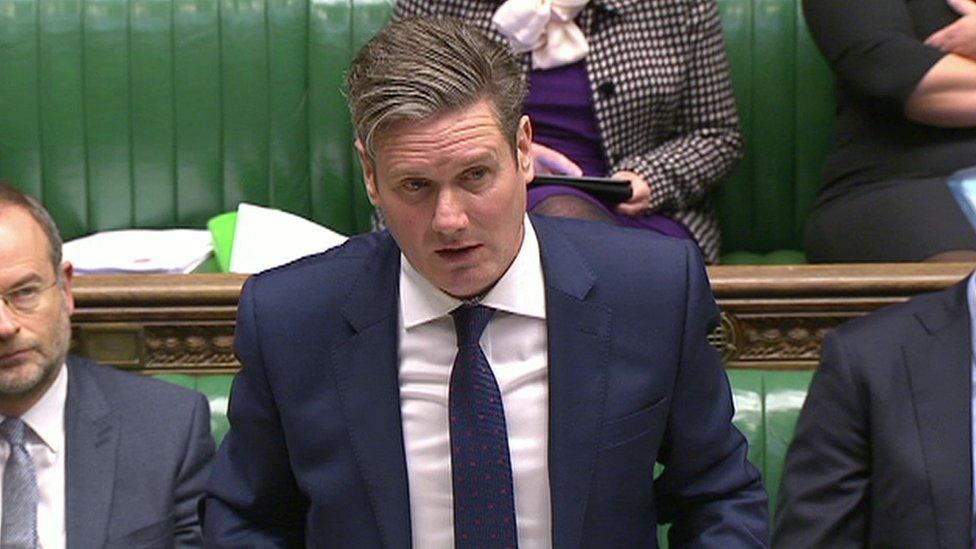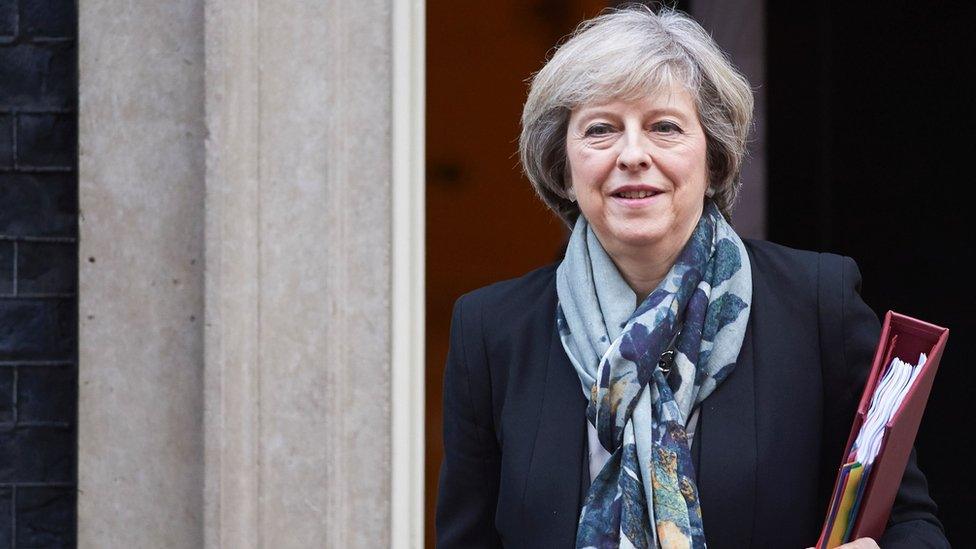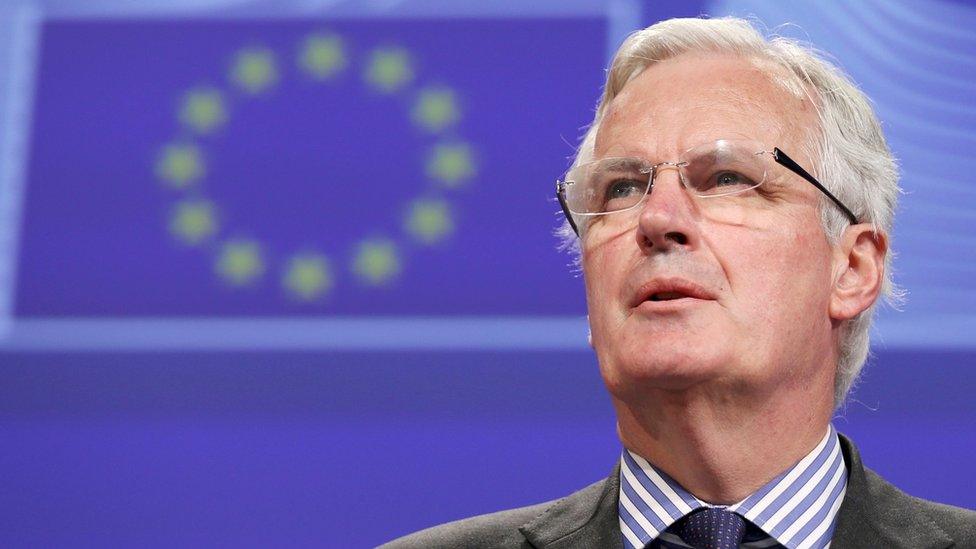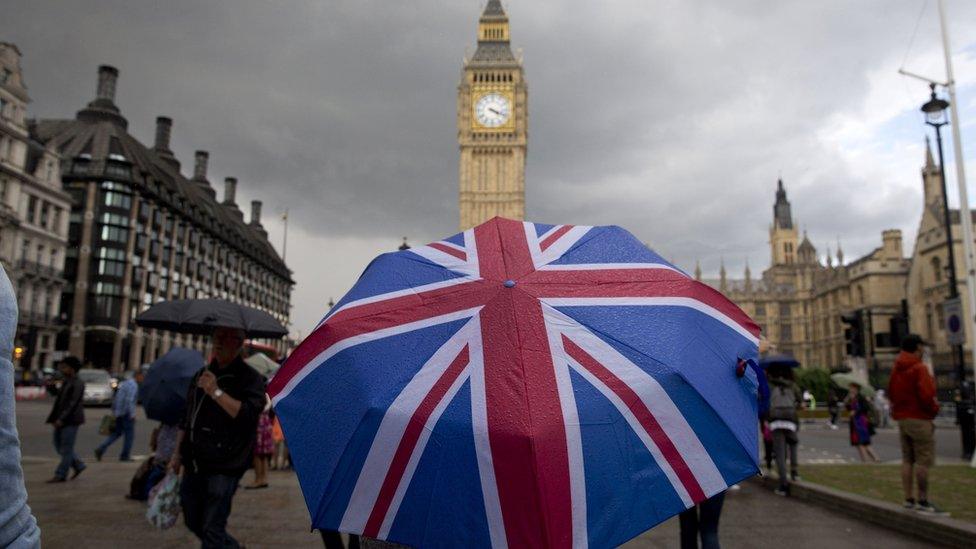Labour says MPs are entitled to Brexit plan details
- Published
- comments

Sir Keir Starmer said ministers had refused to give details "on every occasion"
Parliament is entitled to know details ahead of the UK's negotiations with the EU, Labour said as MPs debated the government's Brexit strategy.
MPs are expected to vote in favour of the government's timetable, of starting formal talks by the end of March, while also calling on the prime minister to publish a "plan" beforehand.
The government said it would set out "strategic plans" before formal talks.
Labour said ministers had now "caved in" by supporting its motion.
MPs are currently voting.
Opening the Commons debate, shadow Brexit secretary Sir Keir Starmer said the government had refused "on every occasion" to give more details, saying information about its negotiating stance was important because it "sets the scene" for Brexit.
The plan which the government has now committed to via an amendment to today's Labour motion must be detailed enough to allow parliamentary scrutiny and enable the Office for Budget Responsibility to assess the impact on the public finances, he said.
Sir Keir said Labour would not allow "a situation where the government seeks a vote in a vacuum, or produces a late, vague plan".
But Brexit Secretary David Davis responded: "The simple fact is that the mandate (in June's referendum) was to leave the European Union - full stop. We need to keep that in mind when we are going through that process."
Adding that the government did not want to declare its position in too much detail before talks with the EU started, he said: "This is a negotiation; it's not a policy statement. And, therefore, where you are aiming for may not be the exact place you end up."
The debate comes after wrangling between the two main parties over the question to be put to MPs.
Labour's motion, external states that it is "Parliament's responsibility to properly scrutinise the government" over Brexit.
Downing Street put forward an amendment agreeing to publish a "plan" before triggering Article 50 of the Lisbon Treaty, which starts formal talks with the EU - although it has not said how detailed this will be. It adds that Parliament must "respect" the verdict of the referendum. Article 50 is due to be triggered by the end of March next year.
Labour and the Conservatives are now both backing the motion, as amended.

Has the PM backed down over Brexit?
By Laura Kuenssberg, political editor
The government has announced that it will accept Labour's idea to publish a plan, of sorts, for Brexit, before Article 50 begins the legal process of the UK disentangling itself from the EU.
Some Tory MPs were set to gang up with Labour in a vote to force ministers to publish something, anything, about their plans for Brexit, against Theresa May's wishes.
Remember, one of the few things that we know for sure about the prime minister's plans for leaving the EU is that she does not want MPs to be able to tinker with them, scrutinise them in a meaningful way, before she actually gets to the negotiating table.
So has she just backed down? In pure terms, yes. Labour's Keir Starmer, the party's Brexit spokesman, will claim victory. And by accepting Labour's idea, ministers have been pushed to do something they had been intent on avoiding - promising to publish their intentions before the technical legal process begins.
But what will that actually look like? So far, so vague. Accepting the amendment does not mean they have promised to do anything in particular.

Both Labour and the government claimed victory when it emerged the final amendment would receive widespread backing in the House of Commons.
Labour said it was a "a welcome and hugely significant climbdown", while government sources said by backing the government's timetable MPs would commit to not delaying the Brexit process.
Former Conservative minister Sir Oliver Letwin, who chaired the government's Brexit unit immediately after the referendum, said he did not expect Theresa May to set out any more detail than what is already known.
The vote will not be binding on the government.
'Parliamentary stitch-up'
SNP MP Angus MacNeil, whose party will vote against the amendment, said: "No answers is not a black Brexit or a white Brexit. It's not a red, white and blue Brexit. No answers is a yellow Brexit. It's a cowardly Brexit."
He said the government's approach showed it had "absolutely no idea" of its aims.
The Liberal Democrats have also said they will oppose the amendment. Leader Tim Farron called it a "parliamentary stitch-up" that failed to "include any meaningful commitment from the Conservative Brexit government to produce the equivalent of a White or Green Paper setting out its position on such fundamental questions as to whether it wants Britain to remain in the single market".
UKIP MP Douglas Carswell said politicians regarded the June referendum, in which voters backed Brexit by 51.9% to 48.1%, as a "mistake" by the public. He added: "They seem to hold out the hope that we might perhaps have a second referendum and, who knows, presumably assemble a new people."
'Good neighbours'
The debate is happening at the same time as the government is fighting a case in the Supreme Court over whether MPs and peers need to have a vote on triggering Article 50. It says there is no need, while campaigners say that not consulting Parliament would be unconstitutional.
Asked about the case, Mr Davis told MPs: "We will obey the rule of law. We will obey what the court finds."
He added that one of the reasons the government would await the court's decision - expected in January - was that it needed to "get precisely right what it is this House has to do".
Prominent Leave campaigner and senior Tory MP Bernard Jenkin said there should be a quick deal and a quick Brexit to reduce uncertainty. He proposed a "zero-zero" offer on tariffs - meaning that the UK would neither charge nor receive money when importing from and exporting to the EU. "We want to be a good neighbour," he said.
- Published6 December 2016

- Published6 December 2016

- Published12 June 2017

- Published30 December 2020
